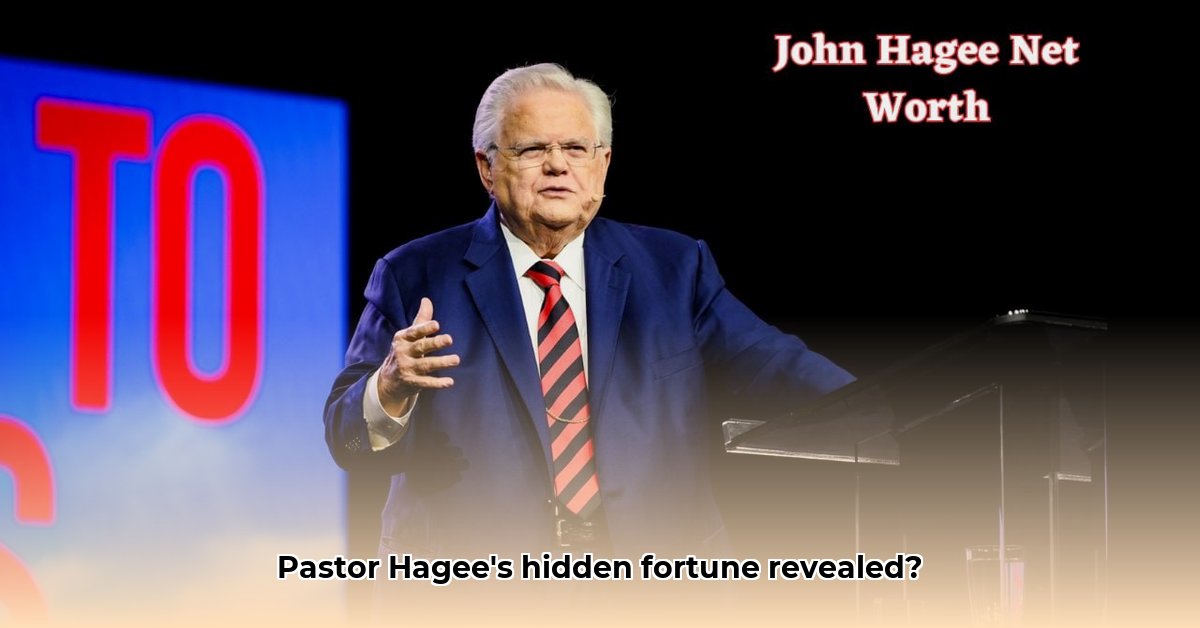
Pastor John Hagee's Net Worth: The Challenges of Estimation
Determining the precise net worth of Pastor John Hagee, a prominent religious figure, presents significant challenges. Unlike publicly traded companies or celebrities, religious organizations often operate with less financial transparency, making accurate estimations difficult. This article will explore the potential sources of Pastor Hagee's income, examine the methodologies used to estimate his net worth, and discuss the ethical considerations surrounding wealth accumulation within religious leadership. For comparison, you might be interested in learning about other religious leader's net worth.
Income Streams: A Multifaceted Revenue Model
Pastor Hagee's income likely stems from several sources. His salary from Cornerstone Church constitutes a substantial portion. However, his substantial influence extends beyond pastoral duties. Royalities from best-selling books, such as "Four Blood Moons," significantly contribute to his earnings. Furthermore, frequent appearances on television and radio, and engagements as a sought-after speaker at conferences and events, represent significant income streams. John Hagee Ministries, his affiliated organization, likely generates substantial revenue, a portion of which may contribute to his personal wealth. Finally, there's the possibility of personal investments, although the extent of these remains undisclosed.
Estimating Net Worth: A Complex Equation with Missing Variables
Estimating Pastor Hagee's net worth is a speculative endeavor. Various online sources offer estimates ranging from millions to tens of millions of dollars. However, these figures lack official confirmation and are often based on estimations of his various income streams, with significant margins of error. The inherent lack of transparency in the financial operations of religious organizations, combined with the complicated tax regulations governing such entities, further complicates the process of accurate financial assessments. Any stated figure should therefore be viewed with considerable caution. A precise numerical value remains elusive.
Financial Transparency and Ethical Considerations: A Matter of Public Trust
The lack of readily available financial information about Pastor Hagee raises critical questions about financial transparency within religious organizations. Advocates of greater transparency argue that open and honest financial practices are essential to build and maintain trust with congregants. They contend that church members deserve to know how their donations are used. Others maintain that a leader's personal wealth is secondary to the ethical operation of the ministry itself. However, critics point to the potential for the misuse of funds, highlighting the need for accountability. This necessitates a nuanced discussion balancing personal privacy with the public's right to know.
The Broader Context: Wealth and Religious Leadership
The issue of wealth accumulation by religious leaders sparks debate within religious and secular spheres. Some interpret substantial wealth as a sign of divine blessing, aligning with the "prosperity gospel." Others consider excessive wealth incompatible with religious teachings of humility and stewardship, raising concerns about potential conflicts of interest and the exploitation of vulnerable members. The discussion surrounding Pastor Hagee's wealth, therefore, transcends a mere curiosity about his net worth; it highlights a critical examination of the ethical responsibilities of religious leaders and the importance of transparency in the management of church finances.
Conclusion: The Elusive Net Worth and the Imperative for Transparency
Pinpointing Pastor John Hagee's net worth remains a challenging, if not impossible, task due to the inherent lack of public financial disclosure within religious organizations. While various estimations exist, their reliability remains questionable given the absence of verifiable data. The focus, however, should shift from obtaining a precise monetary figure to promoting greater transparency and accountability within religious institutions. This not only fosters trust among congregants but also ensures responsible stewardship of financial resources. The ongoing debate surrounding wealth and religious leadership underscores the critical need for a wider conversation on ethics, transparency, and accountability.